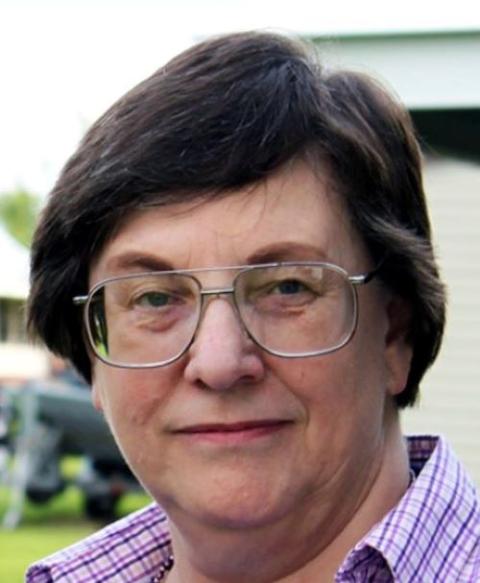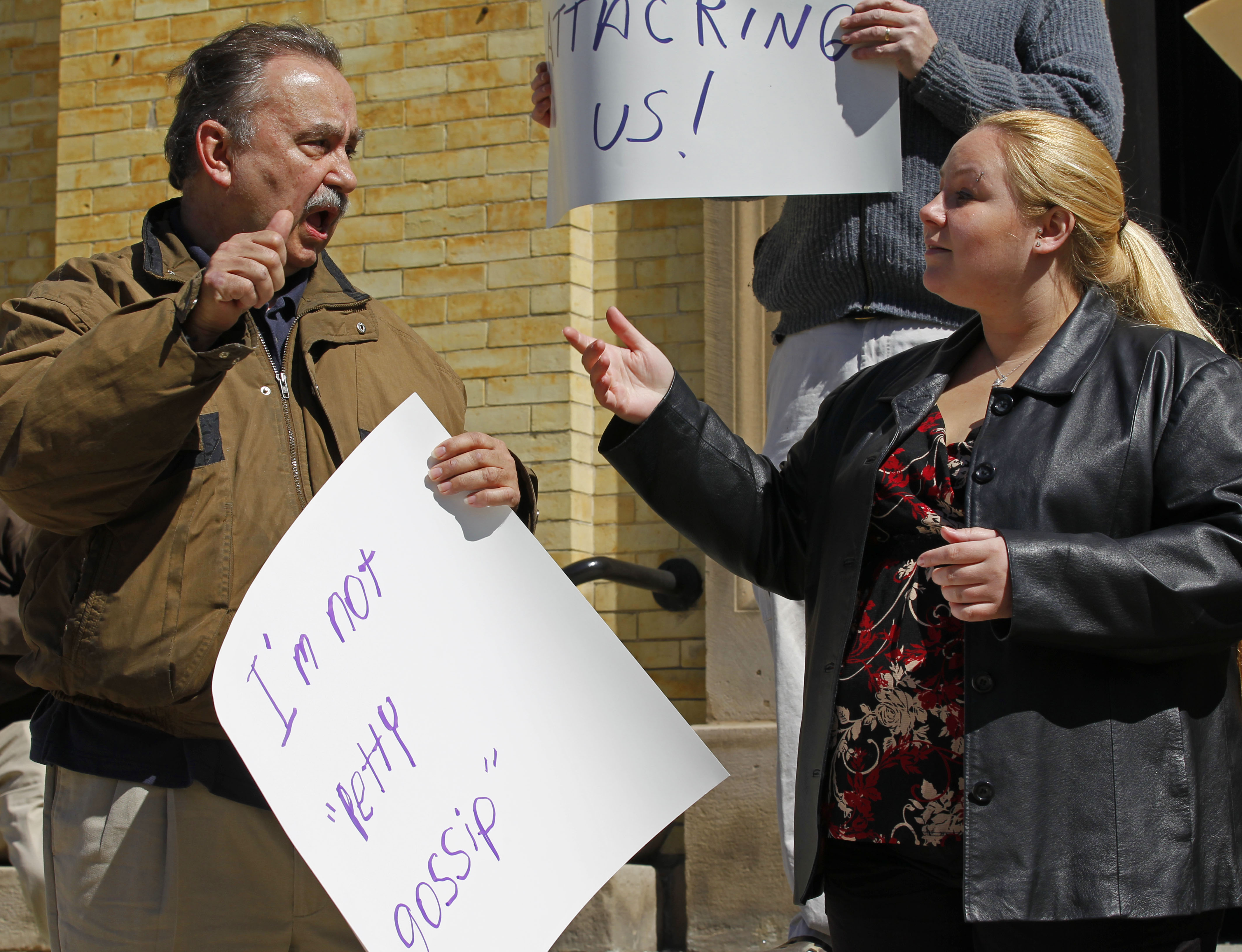
Arthur Budzinski, 61, left, speaks using sign language via his daughter Gigi Budzinski at a press conference outside The Cathedral of St. John the Evangelist in Milwaukee, Monday March 29, 2010. Budzinski was molested while attending St. John's school for the deaf as a youngster by Fr. Lawrence Murphy. (AP Photo/Jeffrey Phelps)
Since January 2019, Fr. Jim Connell of the Archdiocese of Milwaukee has been urging state legislators around the country to repeal clergy-penitent privilege in mandatory reporting laws that exempt Catholic priests from notifying authorities of any sexual abuse they hear about in the confessional.
Milwaukee Archbishop Jerome Listecki has suspended Connell's faculties to hear confessions and grant absolution, citing his advocacy "for the removal of the legal protection of the confessional seal, suggesting there are situations where it is permissible to violate it." Listecki said in a March 22 statement that Connell's "false assertions" that the seal of confession should not apply in some situations had caused "understandable and widespread unrest" among Catholics.
"Protecting the child is more important than worrying about whether the government is going to tell us how to practice our religion," Connell, a retired priest and canon lawyer who served as the Milwaukee Archdiocese's vice chancellor 1994-2012, told NCR in a recent interview.
Connell is still permitted to celebrate Mass and present himself as a priest.
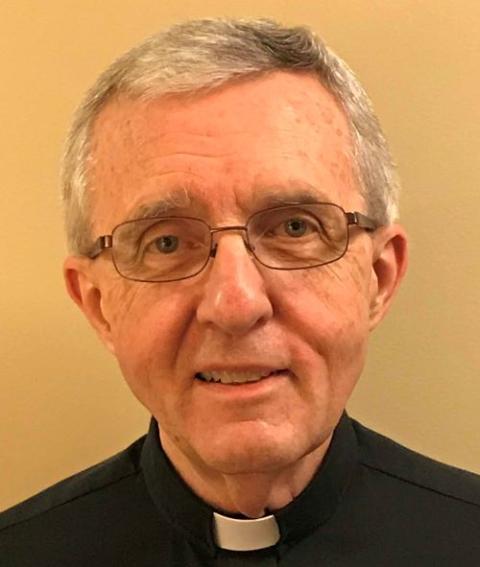
Fr. Jim Connell, former vice chancellor of the Milwaukee Archdiocese, urges state legislatures to remove the clergy exemption from mandatory reporting laws. (Courtesy of Jim Connell)
He said he intends to continue his advocacy, and to work with lawmakers in states including Utah, Delaware and Vermont, where proposed bills would close the so-called clergy-penitent "loophole" in laws that mandate people in certain professions report child sexual abuse. Thirty-three states currently have clergy-penitent exemptions.
"I will not be silenced, and I will not be quiet," said Connell, who in 1995 was assigned to investigate the case of the late Fr. Lawrence Murphy, a notorious predator who used the confessional to target and groom victims, and to solicit sexual favors.
Murphy was appointed director of St. John School for the Deaf in 1963 and in 1973 abuse was first reported to the Milwaukee Police Department, according to a list of clergy abusers on the archdiocese's website. In summer 1974, Murphy was removed from any role at the school.
He faced numerous allegations of abuse over the years, according to the diocese's online list. In 1993 — two years before Connell began his investigation — Murphy self-reported sexual contact with St. John's students between 1952 and 1974. He died in 1998.
'I will not be silenced, and I will not be quiet.'
—Fr. Jim Connell
Connell told NCR that his review of the Murphy files — requested by then-Milwaukee Archbishop Rembert Weakland — "may have planted a seed" that "blossomed years later" as he came to see the secrecy of confession as problematic in some cases.
"I see [the seal of confession] as a church law, and the pope alone has the legislative authority to change the universal law of the church," he said.
But critics say his efforts undermine the sanctity of the confessional and suggest a change in church teaching.
Some canon lawyers, sacramental theologians and priests who support Connell's desire to protect children and vulnerable adults, however, say that the pope cannot amend canon law to require that priests report sexual abuse that they hear about in confession.
"The priest can never say anything to anyone, ever, about a confession," Msgr. Kevin Irwin, a sacramental theologian and former dean at the Catholic University of America, told NCR. "The seal is the most sacred trust priests must keep and that penitents must be able to rely on."
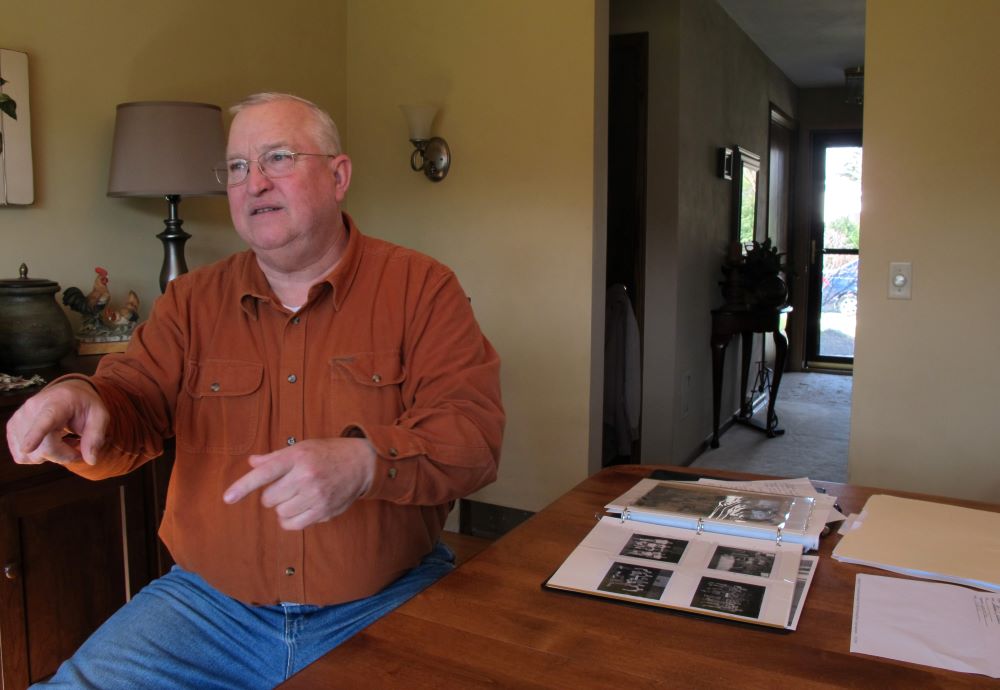
Steven Geier, 59, of Madison, Wis. recalls his time at St. John's School for the Deaf in Milwaukee in the 1960s in this March 25, 2010, photo. He says Fr. Lawrence Murphy sexually assaulted him four times at the school. (AP Photo/Todd Richmond)
Jesuit Fr. Bruce Morrill, a liturgical and sacramental theologian who serves as chair of Roman Catholic Studies at Vanderbilt University, told NCR that very few concepts in Catholic theology are as absolute and of such serious gravity as the seal of confession, even in the case of someone confessing a grave offense such as the sexual abuse of a child.
"The church sees its mission as an agent of God's judgment and mercy to do everything it can to save souls," he said. "The church's responsibility is to make it as available as possible for a soul to be saved. If the state requires this disclosure, then this basically inhibits or makes it very difficult for people to trust that they could confess this, and in the process do what they can for their salvation."
Advocates for clergy sex abuse survivors and civil lawyers who have sued the Catholic Church on behalf of thousands of victims told NCR that the bishops who have denounced the bills as attacks on religious freedom overlook a decades-long history of abusive priests and church leaders who have used the confessional seal to target children and vulnerable adults, and to shield abusive priests from accountability.
"I believe that part of the reason why confession is so prominent in stories of [sexual] abuse is that the power of the sacrament is not acknowledged, including or perhaps even especially by the church," said Terence McKiernan, co-founder and president of BishopAccountability.org, which tracks clergy sexual abuse worldwide.
McKiernan is studying the role of confession in the clergy sex abuse crisis as part of an ongoing research project at the Cushwa Center for the Study of American Catholicism at the University of Notre Dame. McKiernan told NCR that he has thus far documented 207 cases in the United States, and 115 in Australia, of priests exploiting the sacrament to target, groom and abuse vulnerable people.
"Those numbers are the tip of the iceberg," McKiernan said.
Fr. Timothy J. Mockaitis, pastor of Queen of Peace Church in Salem, Oregon, and penitent Ethan K. Alano of Salem demonstrate how a confession is conducted in this May 3, 2019, photo. (OSV News photo/CNS file, Chaz Muth)
A review of grand jury reports, internal church memos, witness depositions, victim statements and trial transcripts in nine cases shared by BishopAccountability.org illustrates how some abusive priests over the course of decades were alleged to have used the sacrament of confession to molest and rape victims, and to keep their crimes secret.
In two cases NCR reviewed, abusive priests told victims to confess their own abuse.
In the 1960s, according to one clergy sex abuse survivor's affidavit, three priests in Iowa who abused minors would confess to one another and give each other absolution.
"I've had many childhood clergy sexual abuse victims who were sexually abused in the confessional when the priest was hearing the so-called confession," said Mitchell Garabedian, a Boston attorney who has represented scores of clergy sex abuse victims since the 1990s.
Garabedian told NCR that one former client said they were forced to perform a sex act on a priest while he was hearing another person's confession. He said other clients reported they were sexually abused by the priests who heard their confessions.
In a 2003 affidavit, a clergy sex abuse victim in Massachusetts wrote that the late Cardinal Bernard Law, the former archbishop of Boston, invoked the confessional seal during a private conversation to silence the victim from telling anyone about a priest who had sexually abused him.
The victim said Law told him: "I bind you by the power of the confessional not to speak to anyone else about this. We don't want to destroy the reputation of this good man's ministry."
Boston Cardinal Bernard F. Law speaks in 2002 as the U.S. bishops deliberate on their national response to the clergy sexual abuse crisis in Dallas. Law resigned in disgrace in December 2002, after The Boston Globe revealed the scope of clergy sex abuse and the institutional cover-up in the Boston Archdiocese. He died in 2017 at 86. (CNS/Bob Roller)
A spokesperson for the Boston archdiocese told The Boston Globe in 2002 that Law, who died in 2017, had "a vague recollection" of the conversation, but did not remember the words exchanged and found it "inconceivable" that he would have counseled someone not to speak of what they had suffered.
Law resigned in disgrace in December 2002, after The Boston Globe revealed the scope of clergy sex abuse and the institutional cover-up in the Boston Archdiocese.
"The priest-penitent privilege is being used as a facade by the Catholic Church to prevent transparency on clergy sexual abuse," Garabedian said.
In his investigation of Murphy, Connell found that the priest was accused of using confession to identify potential victims and sexually assault victims, sometimes during the sacrament. Murphy was accused of abusing as many as 200 boys at a school for the deaf in Milwaukee.
"This was the worst case of confessional abuse in Milwaukee, and one of the worst known cases in the history of Catholicism," McKiernan said.
McKiernan accused Listecki of trying to silence a whistleblower by suspending some of Connell's faculties.
Donna Doucette, executive director of Voice of the Faithful, a reform group founded after the 2002 reporting on clergy sex abuse and cover-up in the Boston archdiocese, told NCR that Listecki's move was "a bit over the top."
"We hope that all of those who have respected and who support the work that [Connell] has done over the years to help survivors obtain justice will support him personally in this, whatever their feelings may be on the seal of confession," Doucette said.
In a prepared statement provided to NCR, Fr. Nathan Reesman, the vicar for clergy in the Archdiocese of Milwaukee, said the archdiocese has "a zero tolerance policy" regarding the sexual abuse of minors, and that the archdiocese's "stringent abuse prevention measures have led to more than 12 years with not one substantiated allegation of sexual abuse of a minor against an archdiocesan priest."
Said Reesman: "Any implication that the decision to remove Fr. Connell's permission to hear confession conveys a lack of commitment by the Church to protect against abuse is false and misleading. The issue at stake is the correct understanding of the seal of confession."
In his statement, Listecki said the archdiocese is "fully committed to the protection of all people from acts of abuse and neglect." The bishop added, though, that that commitment "in no way allows us to endorse or advocate for any practice, policy, or legislative action that would threaten the inviolable nature of the confessional seal, and the clergy-penitent privilege."
'The seal of confession exists to safeguard or to reassure people of the absolute confidentiality of the sacrament, so that they have confidence in coming forward to celebrate it, to know the mercy of God.'
— Msgr. Liam Bergin
Other bishops in recent weeks have made that same point. On March 3, Bishop Christopher Coyne of Burlington, Vermont, testified before the state's Senate Judiciary Committee against a bill that would remove the clergy-penitent privilege from Vermont's mandatory reporter law.
The bill, Coyne testified, "crosses a Constitutional protective element of our religious faith: the right to worship as we see fit." The Catholic bishops in Utah and Delaware, where similar bills are pending, have made similar statements.
"I understand what the bishops are saying. I don't agree with them," said Connell, who wrote a March 13 op-ed in the News Journal, a Delaware newspaper, in support of the bill there to remove the clergy-penitent privilege.
Noting that all 50 states, including Washington, D.C., and federal territories, have enacted laws that require people in certain professions to report child sexual abuse, Connell argues that society has recognized a child's fundamental right to be protected from abuse and neglect. That right, Connell argues, outweighs the right of free religious exercise, which is protected by the First Amendment.
"My hope is that [the pending bills] do stand up as the lawyers start arguing about the constitutionality of this," he said.
Advertisement
Douglas Laycock, a University of Virginia School of Law professor who studies religious freedom cases, told NCR in an email that both sides have good arguments. He said preventing child abuse is "obviously a compelling interest."
"Some judges would uphold [the bills]. I think the current Supreme Court would strike it down," Laycock said.
David Finkelhor, a University of New Hampshire sociology professor who directs the university's Crimes Against Children Research Center, told NCR in an email that the debates about mandatory reporting have included professionals with institutionalized confidentiality claims like doctors and psychotherapists.
Said Finkelhor: "On one level, it is a values conflict: Which deserves more priority, the confidentiality of the discloser or the safety of the endangered child? On another level, there is a debate about effectiveness: Can the minister/doctor/therapist do a better job of protecting the child than the report-receiving agency that would conduct the investigation?"
Finkelhor said he is unaware of any research that shows which approach provides better outcomes for child safety. But he suggested that several considerations tip the balance in favor of required reporting.
"It is very easy for professionals to do nothing on their own, when there is no accountability," he said. "Some professionals have been shown to use their confidentiality privileges to cover up situations that all observers believe did not merit privilege and should have been reported. This includes the kinds of situations such as when clergy became aware of abuse outside of the confessional, such as in school environments."
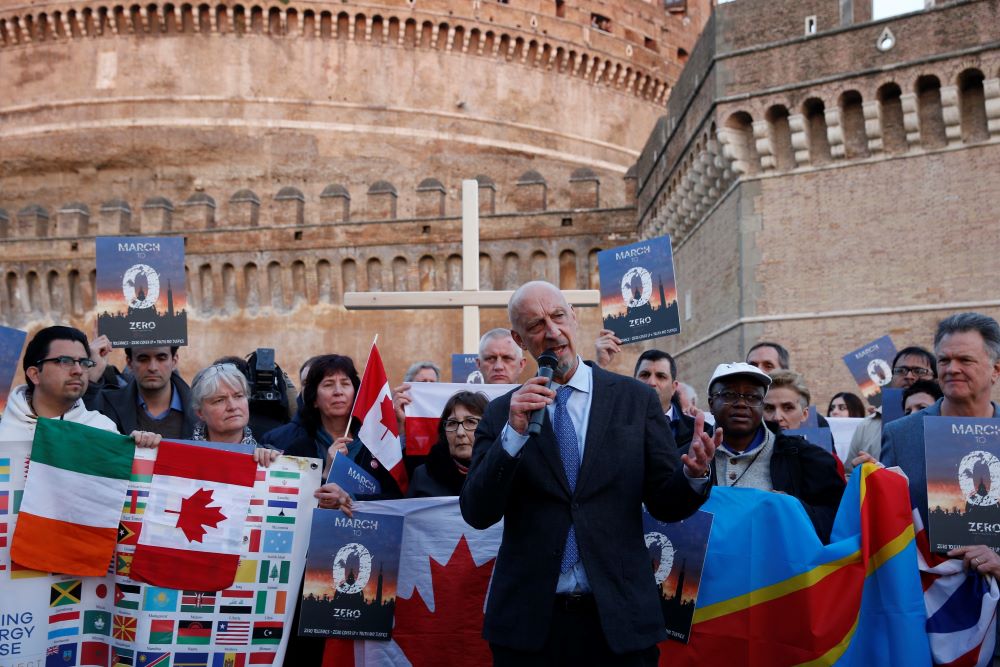
Peter Isely, a survivor of sexual abuse by a priest, gestures during a rally of clerical abuse survivors outside Castel Sant'Angelo in Rome Feb. 21, 2019. (CNS/Paul Haring)
Connell said he hopes that if some states remove clergy-penitent exemptions, it would force the church to reconsider its position on the seal of confession, which he argues is a matter of canon law, not divine law. He noted that early Christians for centuries often underwent public penance before the church codified private confession during the Medieval era.
He said that canon law could be amended to create an exception in the seal of confession for cases of someone having sexually abused a child or vulnerable person.
But Msgr. Liam Bergin of Boston College, a sacramental theologian, told NCR that the seal of confession is intrinsic to the sacrament.
"The seal of confession exists to safeguard or to reassure people of the absolute confidentiality of the sacrament, so that they have confidence in coming forward to celebrate it, to know the mercy of God," Bergin said.
Nicholas Cafardi, a civil and canon lawyer, told NCR that the seal is a "constitutive quality" of the sacrament, and a "divinely instituted" discipline that is "simply not susceptible to change."
"In other words, it is of the essence of the sacrament itself," Cafardi said. "This is a matter of divine law, not church law. The pope can't change divine law."
Holy Cross Fr. Stephen Newton, who serves as executive director of the Association of U.S. Catholic Priests, told NCR that even if he thought it were possible to create an exemption in the seal, that doing so would undermine the sacrament.
"People would not be able to trust the sacrament," he said. "They couldn't trust that there wouldn't be a slippery slope."
Franciscan Fr. Joseph Mary administers the sacrament of reconciliation to Jasmine Torres, 16, of the Bronx, N.Y., in this 2007 file photo. (CNS/Long Island Catholic/Gregory A. Shemitz)
Priests who learn of sexual abuse during a confession can encourage the penitent to surrender to law enforcement, or suggest to someone who disclosed the abuse to meet with them outside the sacrament.
The priest also can withhold absolution if he has strong reason to believe that the penitent is not contrite and has no intention of changing their behavior. But theologians say the priest cannot mandate penitents surrender themselves to law enforcement as a penance.
"The priest could suggest to [the penitent] that the most helpful penance for them would be to go to the authorities, but if the person says they cannot do that or are incapable of that, then [the priest] can't really require that," said Morrill, the sacramental theologian from Vanderbilt University.
"I cannot impose a penance that a person can't do, because that would be merciless and unjust," Morrill said.
Newton emphasized that even if a priest withholds absolution during the sacrament, he still cannot break the seal of confession.
"People would have to realize that the priest is willing to go to jail rather than violate the seal," Newton said.
Despite having his confessional faculties suspended by his archbishop, Connell said he stands by his view. "We as a church need to get to the point where confidentiality is less important than protecting the kids," he said.

